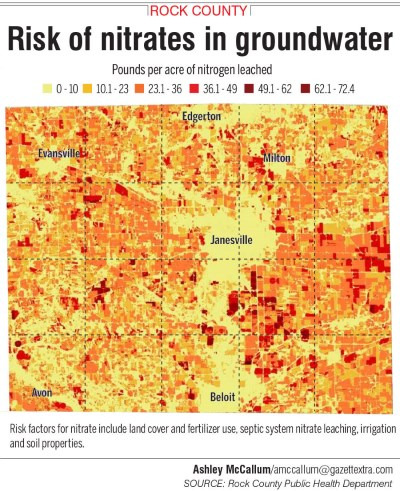
Just south of Madison, there is a problem with Rock County’s wells. Contaminated water is posing a serious threat to the health of those who live there. The culprit—nitrate.
Nitrate
is a poisonous chemical found in fertilizer. Consuming water with nitrate can lead to life-threatening diseases, such as cancer. The effects are worse for pregnant women and babies, because nitrates can cause blue baby syndrome—a lack of oxygen in the infant’s bloodstream.
Nitrate levels are increasing in the well water of Rock County, home to Janesville and Beloit. There are about 15,000 wells in Rock County, but only about 1,000 are tested each year. In 2012, the nitrate levels were the highest they had been since the 1980's and the problem is only getting worse. Water is considered hazardous if nitrate levels reach ten parts per million. In Rock County, about 30 percent of the wells tested were above that level. Once nitrate levels reach 20 parts per million, the water is considered undrinkable.
There are several reasons for the nitrate rise in Rock County. Nitrate comes from decaying plant material, as well as from manure and fertilizer run-off. Health experts say the biggest contributor to the increase in nitrates in Rock County is the 2012 drought. When the drought occurred, the plants did not use the fertilizers in the soil. These fertilizers seeped deeper when the rain returned and over the years have been absorbed into the underground water system. Also, Rock County’s growing corn industry led to an increase in fertilizer, possibly contributing to the nitrate rise.
The rising nitrate levels in Rock County are worrying the local population. The Health Department says they receive a dozen calls a week from residents concerned about water safety.
Health officials suggest affected homeowners install a water treatment system. The most effective is a "reverse osmosis system.” It removes about 95 percent of the nitrates in the water, but can cost up to 500 dollars. Another solution is to dig deeper wells, but deeper wells do not guarantee less nitrates and the problem could even worsen. A temporary alternative is to use bottled water for drinking and cooking.
[Sources:
Channel 3000
;
Janesville Gazette
]

